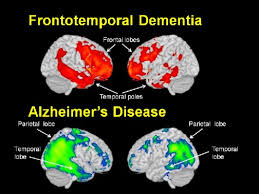
Frontotemporal Degeneration (dementia), FTD, is not a term you hear very often, but it’s important to know what it is. It presents very differently from Alzheimer’s disease.
I recently became a volunteer for the AFTD (Association of Frontotemporal Degeneration) because of an awesome, but heart-breaking presentation I heard at a professional networking meeting recently.
The presenter was telling us about her family’s experience with this form of dementia. Her husband was diagnosed with FTD at the age of 29. Soon after he was in need of nursing home care and he died at the age of 33 when their first child was 2 years old. He was quite young to have experienced this disease and it took numerous visits to several doctors before he was diagnosed properly.
FTD usually strikes people when they are in their 50’s or early 60’s, but it can be diagnosed at a much earlier age and its life span runs about 10 years. But as we know, and as we see in this unfortunate situation, every person is different. No two situations are alike.
FTD affects the frontal and temporal lobes of the brain. These are the areas behind the forehead and above the ears. So, what do these parts of the brain do……what “responsibility” do they have in our day to day life?
These parts of the brain control our executive functions which connect our past with the present and future. That includes organizing, long range planning, speaking, judgment, understanding language, managing space and time, as well as our emotions.
The behaviors we see are poor judgment, consequently inappropriate behaviors or speech; Inability to multi-task; Difficulty retrieving information; Emotional instability; Loss of fine motor skills; Inability to understand language; Mood swings; and little or no concern for others. People with FTD have difficulty in large spaces and with loud noises as it is difficult for them to concentrate and then process what is happening around them. It’s as if their internal filters are no longer working so they say and do things that are socially unacceptable. They do have memory loss, but that comes later in the disease process and not in the early stages. That is one of the things that distinguishes FTD from Alzheimer’s disease.
Many people are misdiagnosed over a period of years and move from doctor to doctor looking for answers. Recent research has linked FTD and ALS (Lou Gehrig’s disease) as part of the same disease spectrum. Unfortunately, there is no cure for FTD. FTD is progressive and is a terminal disease.
If you suspect someone in your family might have this disease and is exhibiting some of the symptoms above, please contact The Association of Frontotemporal Degeneration or by calling 866-507-7222. Their website and staff will be able to assist you with helpful information and materials.
Photo Credit: frontotemporaldementia.info

Leave a Reply